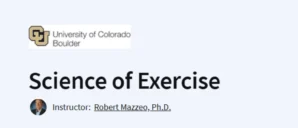
What you will learn in Sleep: Neurobiology, Medicine, and Society Course
- Neuroscience of sleep/wake cycles
- Sleep’s impact on cognitive performance
- Diagnosis of sleep disorders (insomnia, apnea, narcolepsy)
- Evidence-based sleep improvement techniques
- Societal consequences of sleep deprivation
- Pharmacological vs behavioral interventions
- Sleep across the lifespan
Program Overview
Sleep Neurobiology
⏱️ 1 weeks
- Covers circadian rhythms, sleep stages (NREM/REM), and neurotransmitter systems.
- Includes brain imaging studies.
Sleep Medicine
⏱️1 weeks
- Diagnostic criteria for major sleep disorders, polysomnography interpretation, and treatment algorithms.
Sleep Optimization
⏱️ 1 weeks
- Evidence-based sleep hygiene, CBT-I techniques, and light/dark cycle management.
- Features sleep tracking analysis.
Societal Impact
⏱️ 1 weeks
- Examines sleep deprivation’s effects on healthcare, transportation, and education systems. Includes policy discussions.
Get certificate
Job Outlook
- Professional value: Essential for healthcare providers
- Salary potential: Sleep specialists earn 200K300K
- Industry demand: Growing sleep medicine field
- Certification benefit: Counts toward CCSH credentials
Specification: Sleep: Neurobiology, Medicine and Society
|
FAQs
- Gain a solid understanding of the neurobiology of sleep, including sleep/wake regulation, neurotransmitter systems, and brain imaging findings.
- Learn about major sleep disorders—such as insomnia, sleep apnea, and narcolepsy—and how they’re diagnosed.
- Understand the long-term health consequences of poor sleep, including effects on cardiovascular health, mental well-being, immune function, and daytime performance.
- Master evidence-based strategies for sleep improvement, like sleep hygiene, CBT-I, light/dark exposure management, and behavior-based interventions.
- Discover the societal impact of sleep deprivation—its effects on public health, safety, education, transportation, and policy.
- The course consists of 12 modules, divided into three thematic sections: Neurobiology, Medicine, and Society.
- Official estimates suggest 2 weeks at approximately 10 hours per week, totaling an estimated 20 hours of engagement.
- Other sources mention 21 hours to complete, or 3 weeks at about 7 hours per week, depending on pace.
- The Neurobiology section covers sleep mechanisms including circadian rhythms and neurotransmission.
- The Medicine section addresses sleep disorders and clinical treatments, and the Society section explores broader implications like policy, public safety, and educational impacts.
- The course is labeled beginner level, and no prior experience is required.
- However, some course overviews (e.g., Course Careers) note it requires basic biology knowledge, meaning those stronger in science may benefit more.
- Reviews point out the Honors Track—covering topics like mathematical modeling and molecular genetics—can be particularly challenging.
- So while accessible, the course may feel demanding if you’re not familiar with biological terms or brain anatomy.
- Yes! The course offers a shareable certificate of completion that can be added to your LinkedIn profile, CV, or résumé.
- It is offered by the University of Michigan, adding institutional credibility.
- Completing this credential can be especially useful if you’re entering fields like healthcare, public health, or sleep medicine.
- Financial aid may be available if cost is a concern.
- The course is led by Ralph Lydic, Ph.D., alongside specialists such as Helen Baghdoyan (neurobiology), Ronald Chervin (sleep medicine), and others.
- It stands out by weaving together neuroscientific foundations, medical application, and societal relevance into one cohesive learning experience.
- A unique feature: learners can opt for a Standard Track or a more in-depth Honors Track for deeper exploration of topics like modeling and molecular genetics.
- Students praise the course as well-organized, informative, and rigorous, though some forums lack active discussion.
- The course’s blend of clinical relevance, policy insight, and sleep science offers rich value for diverse learners—from curious individuals to healthcare professionals.




